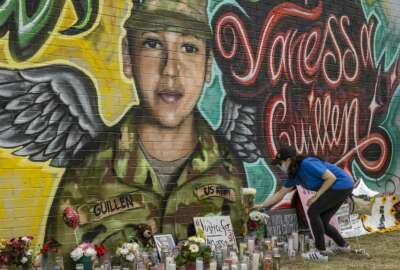

Forces Command IG Col. Patrick Wempe said they "may not have the life experience or the military experience" to handle the situations.
It’s been less than a month after Army Specialist Vanessa Guillen’s body was found outside Fort Hood, Texas. Before she was killed she was a victim of sexual harassment, causing lawmakers to become increasingly concerned about the state of women in the military.
Guillen’s death sparked a worldwide movement of service members and veterans divulging their sexual harassment and assault stories.
Military sexual assault and harassment numbers are on the rise. After spending time at Ft. Hood, the inspector general for Army Forces Command (FORSCOM) is pointing the finger at junior officers.
Command Inspector General Col. Patrick Wempe said soldiers told the office they trusted senior leaders to take sexual harassment seriously, but “the junior leaders may not have the life experience or the military experience to deal with the situation as it was presented to them.”
Speaking before the House Armed Services Personnel Subcommittee, Wempe said his recommendation is to focus training on first line supervisors and junior leaders.
The military currently informs troops of the Sexual Harassment Assault Response Prevention (SHARP) program, which allows service members to report incidents, within 14 days of joining basic training.
“When you go to your advanced school you get additional information about what’s acceptable and what’s not as far as behavior goes,” Nate Galbreath, deputy director of the Defense Department’s Sexual Assault and Prevent Response Office, said. “We’ve taken a number of efforts since May of 2019 to ensure our junior leaders and our first line supervisors will have the skill to be able to address this behavior when they see it and shut it down.”
Galbreath said DoD is also providing commanders with revised climate surveys that allow them to detect and take action on challenges in their unit.
However, despite soldiers reporting to the FORSCOM IG that they are aware of the training and how to report, sexual harassment and assault continues to be a problem.
“At Fort Hood we observed the SHARP program needing to improve in certain areas, but one which units generally execute the standard,” Wempe said. “Soldiers reported a hesitancy to report SHARP incidents for several disparate reasons.”
Those included extended hiring times for SHARP personnel and that “repetitious and unimaginative” training.
Wempe’s remarks led lawmakers on the committee to question whether the standard is working considering the results and wondered why the promotion system was putting people in positions of leadership who could not handle the responsibility.
“Little has changed in 40 years, except we have thrown a lot of money at this problem,” House Armed Services Personnel Subcommittee Chairwoman Jackie Speier (D-Calif.) said. “I estimate it’s close to a billion dollars now. What do we have to show for it? I’ve spent 10 years on this issue. I don’t take any pride on the numbers going down or going up because, frankly, for all that we have done not much has changed.”
DoD saw sexual assault in the military rise from nearly 15,000 in 2016, to 20,500 service members in 2018.
DoD’s 2019 annual report shows an overall increase of 3% in the number of reports filed by or about military members during 2019. That percentage is much smaller than the previous year’s jump of 13%, according to The Associated Press.
Copyright © 2024 Federal News Network. All rights reserved. This website is not intended for users located within the European Economic Area.
Scott Maucione is a defense reporter for Federal News Network and reports on human capital, workforce and the Defense Department at-large.
Follow @smaucioneWFED
